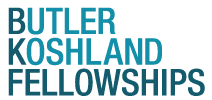Daniel E. Koshland, Sr.
1892-1979
Dan Koshland was a civic leader, philanthropist, and businessman whose legacy is a guiding light for those working for positive social change. Humble, kind, and funny, Dan viewed the wealth and privilege he was born into as responsibility—one that meant he should work tirelessly to bring dignity, opportunity, and equality to all people, regardless of gender, race, or class. Or as he put it, “you have to think of the other guy.”
Dan was born in San Francisco in 1892. His family roots were Bavarian Jewish and he was the grandson of Simon Koshland, who came west during the Gold Rush, and a son of Marcus Koshland, both wool merchants. His mother was Corinne Schweitzer. He attended Lowell High School in San Francisco and earned a degree in Economics from the University of California, Berkeley. After graduating, Dan moved to New York City where he worked as a banker. In 1917 he returned to San Francisco to attend US Army officer training camp at the Presidio. After completing his training he was eager to “do his duty” overseas during World War I but his request to transfer to the Intelligence Corps was denied because of his German last name. Disappointed, he served stateside at Governor’s Island, New York instead. His spirits were soon lifted when he married Eleanor Haas in 1918. The couple shared a passion for community service and this common bond made their marriage a harmonious and purposeful one. Eleanor’s later diagnosis of Multiple Sclerosis would allow her her to become a leader for the disabled and inspire the whole family in support of her causes. Despite her condition, she remained a cheerful and active member of the philanthropic community and a devoted mother to their three children: Daniel Jr., Frances (“Sissy”), and Phyllis. Together they enjoyed a very happy family life with Dan feeling that the whole extended Haas-Koshland family was especially fortunate to be so close-knit and civic-minded.
In 1922 Dan and Eleanor left New York City and returned to San Francisco where Dan had been asked to join his brother-in-law Walter A. Haas, Sr. at the helm of Levi Strauss & Company—at that time a small drygoods wholesaler and maker of work clothing. Together they would lead the company through the Great Depression, the racial integration of its factories, the global popularization of Levi’s, and the formation of the Levi Strauss Foundation. Eventually joined by Walter’s children, Walter Jr. and Peter, this family team developed Levi Strauss & Company into both a profitable enterprise and a leader in corporate civic engagement. From 1955 to 1958, Dan served as CEO of Levi Strauss & Co. and was a director and honorary chairman of the board at the time of his death.
To say that Dan was an active member of the San Francisco philanthropic community would be a great understatement. It would be impossible to list all of his good deeds here (especially since much of his giving was done anonymously) so what follows is only a small example of his commitments. In addition to his work with the Levi Strauss Foundation, Dan held positions with the Industrial Welfare Commission; Human Rights Commission; San Francisco Juvenile Probation Committee; Planned Parenthood; Mt. Zion Hospital; the Community Chest; United Bay Area Crusade; Citizen’s Lobby for Freedom and Fair Play; San Francisco Development Commission on Low-Cost Housing; Council on Civic Unity; and the Red Cross. He was also part of an effort to organize business leaders to create jobs for refugees fleeing Nazi Germany, many of whom were hired by Levi Strauss & Company. In addition to the fundraising campaigns Dan led for his alma mater Cal, he was a champion of projects that would expand education to people who were not being served by traditional institutions. To this end, Dan served as the national vice chairman of the United Negro College Fund campaign and was also a leader in the fight against anti-Semitism common at that time in many universities. Along with other prominent Jews, including Albert Einstein, Dan was involved in the founding of Brandies University, a Jewish-sponsored secular university open to all qualified students, the founding of which was a response to quotas limiting Jewish participation at other institutions. He was also involved in the movement to develop low-cost adult education via community colleges, supporting the College of San Mateo and Cañada College.
One of Dan’s greatest achievements was the establishment of the San Francisco Foundation which was founded in 1948 and today has grown to be one of the largest community foundations in the nation—each year it gives millions of dollars in support of Dan’s values.
After the passing of his first wife, Eleanor, Dan married Lucile Heming in 1959. A longtime friend of the Koshland family and a former president of the League of Women Voters, Lucile shared Dan’s interest in public service and they participated together in many philanthropic activities.
Dan passed away December 12, 1979. At the time of his death he was survived by son Daniel, Jr and his wife Marian and their five children: Ellen Ruth, Phyllis Ann, James Marcus, Gail Frances, and Douglas Elliott; daughter Frances (“Sissy”) and her husband Theodore H. Geballe and three children: Gordon Theodore, Alison Frances, and Adam Philip; and daughter Phyllis, her husband Howard A. Friedman and their three children: Robert Eric, Eleanor Frances, and David Alan.
The flame Dan lit for justice is aptly carried by his family who has continued his work with the same spirit and dedication with which it was began. It also shines in all those Dan mentored who in turn have shared his vision for equality and opportunity with the next generation. To honor this legacy, many programs and awards have been named in honor of Daniel E. Koshland, Sr. including the Jewish Community Federation’s Haas/Koshland Award, the Koshland Young Leader Award of the San Francisco Foundation, and Butler Koshland Fellowships.
